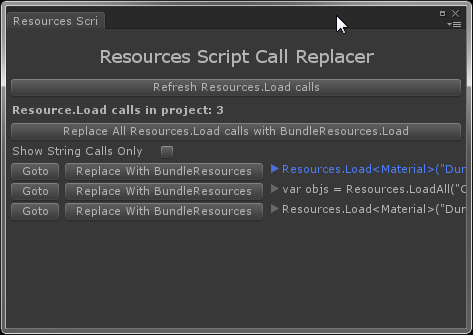Bundle Resources Documentation
Overview
Welcome to the Bundle Resources documentation page. Bundle Resources is intended to make the process of migrating from using the Resources folder to asset bundles as painless as possible, with minimal project hierarchy changes, and minimal code changes.
Getting Started
After importing the package, navigate to the FSG/BundleResources/Resources/ folder and select the BundleResourcesSettings asset. Here you can see the list of folders that will be bundled as well as other settings.
Migrating Assets
Once you have decided which assets you would like to move from Resources into Asset Bundles, create (or rename) a folder named ResourcesBundled. Using this folder name will automatically add it to the bundling process. Also, a folder can be dragged into the Bundle Folders array inside of the BundleResourcesSettings asset.
By default, folder structure determines how assets will be bundled. Each folder and sub-folders will be put into it's own bundle. If you would like to use BundleResources.LoadAll to load all assets in a folder, and it's sub-folders, drag the folder into the Single Bundle Folders array in the BundleResourcesSettings asset.
Bundle Resources Settings

This asset stores settings about folders to be bundled as well as an asset index for editor use. It can be easily selected by navigating to the Assets > Bundle Resources > Select Bundle Resources Settings.
- Rebuild Bundles for Platform - Builds asset bundles for the current targeted platform set in the Build Settings menu. Can also be done by navigating to the Assets > Bundle Resources > Rebuild Resource Bundles menu.
- Use Bundles In Editor - Enable/Disable using built bundles in the editor for testing. Can also be changed by navigating to the Assets > Bundle Resources > Editor Bundle Mode > Use Bundles > Use Assets.
- Bundle Folders - A list of folders to be included in the bundling process.
- Single Bundle Folders - All assets in the specified directories will be bundled into a single bundle, instead of separate bundles per sub-folder.
- Indexed Files - Displays how many assets are indexed to be bundled.
Resources Script Replacer

The Resources Script Replacer is a utility that makes it easier to find and replace Resources.Load and Resources.LoadAll calls in the project.
- Open the tool by navigating to Assets > Bundle Resources > Resources Script Replacer.
- The tool will search all scripts in the project and find
Resources.Loadcalls. - Using the display, you can choose to open the file to the line that references
Resources, or replace the it withBundleResources.Load.
Tool Usage
Using Bundle Resources
Using Bundle Resources is virtually the same as using a Resources folder. If you have not used the Resources before, familiarize yourself with it here. All of the calls remain the same, excluding Resources.UnloadUnusedResources().
- Create a ResourcesBundled folder or populate the Bundle Folders array on the BundleResourcesSettings asset.
- Build the bundles for the platform.
- Open the Resources Script Replacer and replace relevant
Resources.Loadcalls withBundleResources.Load. - **NOTE**
BundleResources.LoadAsyncreturns aCustomYieldInstructionnot aResourceRequest. - The
CustomYieldInstructioncan be yielded on just like aResourceRequest, and has the same properties. - Example:
IEnumerator LoadAsset() { // Load bundle and asset asynchronously var request = BundleResources.LoadAsync<Material>("Materials/MyMaterial"); // Wait for it to finish loading yield return request; // Retrieve the asset Material loadedMaterial = request.asset; // Unload the bundle it was loaded from to free up memory // NOTE passing true into this method also unloads any assets loaded from the bundle BundleResources.UnloadBundle("Materials/MyMaterial", false); } - Test your project! At this point everything should be setup correctly! For editor testing turn on Use Bundles In Editor on the BundleResourcesSettings asset.
Converting The Project
If you have any questions or issues please email me at jschieck@gmail.com and thanks for your support!
BundleResources Methods
// Loads an Object from an asset bundle // Asset path relative to the parent bundled folder public static Object Load(string path); // Loads an Object of the specified System.Type from an asset bundle // Asset path relative to the parent bundled folder // System.Type of object to load public static Object Load(string path, System.Type systemTypeInstance); // Loads an Object of type T from an asset bundle // Asset path relative to the parent bundled folder public static T Load<T>(string path) where T : Object; // Loads all Object's in the folder // Asset path relative to the parent bundled folder public static Object[] LoadAll(string path); // Loads all Object's in the folder // Asset path relative to the parent bundled folder // System.Type of object to load public static Object[] LoadAll(string path, System.Type systemTypeInstance); // Loads all objects of type T from an asset bundle // Asset path relative to the parent bundled folder public static T[] LoadAll<T>(string path) where T : Object; // Loads an Object from an asset bundle asynchronously // Asset path relative to the parent bundled folder public static BundleResourceRequest<Object> LoadAsync(string path); // Loads an Object of the specified System.Type from an asset bundle asynchronously // Asset path relative to the parent bundled folder // System.Type of object to load public static BundleResourceRequest<Object> LoadAsync(string path, System.Type type); // Loads an Object of type T from an asset bundle asynchronously // Asset path relative to the parent bundled folder public static BundleResourceRequest<T> LoadAsync<T>(string path) where T : Object; // Unloads all loaded asset bundles // Also unload any loaded objects from the bundle public static void UnloadBundles(bool unloadAllLoadedObjects = true); // Unloads the specified bundle for the path provided // Path of the object, or folder, relative to the parent bundled folder public static void UnloadBundle(string path, bool isFolderPath, bool unloadAllLoadedObjects = true);